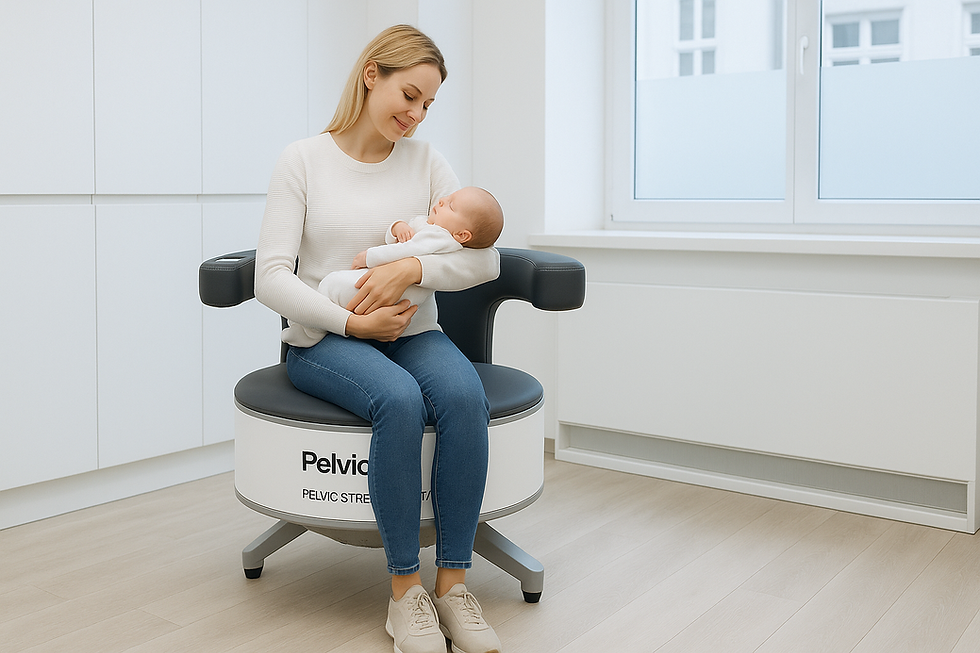
Menopause and Your Pelvic Floor: A Complete Guide
- Team Pelvic Zone

- Aug 12, 2025
- 4 min read
Menopause brings many changes that we don't always see coming. While hot flashes and mood swings get most of the attention, there's another significant shift happening that affects millions of women across the UK: the weakening of pelvic floor muscles due to hormonal changes.
At Pelvic Zone, we've worked with thousands of women navigating this challenging time, and we understand just how frustrating and isolating these changes can feel. The good news? There are effective solutions that don't involve invasive procedures or months of uncertain results.
Understanding the Hormonal Impact on Your Pelvic Floor
The relationship between menopause and pelvic floor health is more connected than many women realise. During perimenopause and menopause, oestrogen levels drop dramatically. This hormone plays a crucial role in maintaining the strength and elasticity of tissues throughout your body, including the muscles and connective tissues that make up your pelvic floor.
Oestrogen helps maintain collagen production, which keeps tissues supple and strong. When these levels decline, the pelvic floor muscles can lose their tone and support function. This is why many women experience their first episodes of bladder weakness or pelvic discomfort during their 40s and 50s, even if they've never had these issues before.
We've seen countless clients who thought these symptoms were simply "part of getting older" or something they had to accept. The reality is quite different. Your pelvic floor responds well to targeted treatment, even after hormonal changes have occurred.
Recognising the Signs: What to Watch For
The symptoms of pelvic floor dysfunction during menopause can be subtle at first, then become more pronounced over time. Many of our clients initially dismiss these early warning signs, thinking they're temporary or unimportant.
Bladder leakage during coughing, sneezing, or laughing is often the first sign women notice. This stress incontinence can progress to more frequent accidents or sudden, urgent needs to use the toilet. Some women also experience a feeling of heaviness or pressure in the pelvic area, particularly after standing for long periods.
Changes in intimate health are equally common but less frequently discussed. Many women notice reduced sensation or satisfaction, which can affect confidence and relationships. Lower back pain may also intensify, as weakened pelvic floor muscles struggle to provide adequate core support.
We encourage women not to wait until symptoms become severe. Early intervention typically leads to better outcomes and helps prevent further deterioration of pelvic floor function.
The Science Behind Magnetic Pelvic Floor Therapy
Traditional pelvic floor exercises can be helpful, but they often fall short during menopause when muscles have lost significant strength and tone. That's where our innovative approach makes a real difference.
Our CE-certified medical device uses magnetic field technology to create up to 12,500 supramaximal contractions in a single 28-minute session. These contractions are far more intense and precise than what you can achieve through voluntary exercise alone. The magnetic fields penetrate deep into all three layers of pelvic floor muscles, providing comprehensive strengthening that addresses the root cause of symptoms.
This technology is particularly effective for menopausal women because it bypasses the challenges of weakened muscle memory and reduced oestrogen sensitivity. The magnetic stimulation works regardless of your current fitness level or ability to perform traditional exercises correctly.
Why Our Approach Works for Menopausal Women
We've specifically designed our treatment programme to address the unique challenges facing women during menopause. The beauty of magnetic pelvic floor therapy lies in its efficiency and effectiveness when hormonal support for muscle function has diminished.
Each session targets the entire pelvic floor complex without requiring you to remove clothing or undergo invasive procedures. You simply sit comfortably in our specialised chair while the technology does the work. Many clients tell us they use this time to read, check emails, or simply relax.
The treatment is particularly beneficial because it doesn't rely on oestrogen to be effective. While hormone replacement therapy can help some symptoms of menopause, our magnetic therapy strengthens muscles through direct stimulation, providing results regardless of hormonal status.
We've found that menopausal women often see noticeable improvements after their first session, with significant progress typically achieved within a few weeks of regular treatment.
Beyond Physical Treatment: Supporting Your Overall Wellbeing
We recognise that pelvic floor issues during menopause aren't just physical challenges. They affect your confidence, relationships, and quality of life. That's why we integrate neuroleadership coaching techniques into our approach, helping you address any negative thought patterns or emotional barriers that may have developed.
Many women feel embarrassed about their symptoms or believe they're alone in experiencing these changes. Our supportive environment and experienced team help normalise these experiences while providing practical solutions.
The mental and emotional benefits of regaining pelvic floor strength often surprise our clients. Improved confidence, better sleep, and renewed intimacy frequently accompany the physical improvements.
Starting Your Journey to Better Pelvic Health
We believe every woman deserves to feel confident and comfortable in her body, regardless of where she is in her menopausal journey. Our approach is designed to fit seamlessly into busy lifestyles, with appointments available at convenient times and no lengthy recovery periods.
During your initial consultation, we conduct a thorough assessment to understand your specific symptoms and concerns. This personalised approach ensures your treatment plan addresses your individual needs rather than following a one-size-fits-all protocol.
We're committed to transparency and never use pressured sales tactics. Our goal is to provide you with clear information about what we can achieve together and realistic expectations about your timeline for improvement.
Taking the Next Step
If you're experiencing any signs of pelvic floor weakness during menopause, we encourage you to explore your options sooner rather than later. The combination of hormonal changes and time can worsen symptoms, but early intervention often leads to excellent results.
We offer free trial sessions because we believe you should experience our innovative pelvic floor therapy firsthand before making any commitments. This allows you to feel the technology working and ask any questions in a relaxed, pressure-free environment.
Our team understands the sensitive nature of these concerns and provides completely private, discreet care. Many of our clients wish they had discovered our treatment sooner, rather than struggling with symptoms or limiting their activities unnecessarily.
Don't let menopause dictate the quality of your life. With the right support and treatment, you can maintain strong pelvic floor function and continue enjoying all the activities that matter to you.




Comments